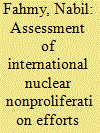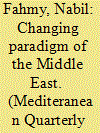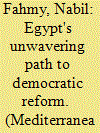| Srl | Item |
| 1 |
ID:
074600


|
|
|
| 2 |
ID:
060289


|
|
|
| 3 |
ID:
073127


|
|
|
| 4 |
ID:
102390


|
|
|
|
|
| Publication |
2011.
|
| Summary/Abstract |
This article explores the official Egyptian reaction to the 2010 US Nuclear Posture Review (NPR) through three lenses: Egypt's national security prism; its ideological stance on nuclear weapons; and the compatibility of the 2010 NPR's goals with the position on nuclear weapons of Egypt's like-minded cohort states, including members of the League of Arab States, the African Union, the Non-Aligned Movement, and the New Agenda Coalition. Egypt is one of the strongest US allies in the Middle East, a region considered a hotbed of potential nuclear weapons development and activity. As such, Cairo's opinion on the direction of recent US nuclear weapons policy could provide valuable insight into the feasibility of the US goals of preventing nuclear proliferation and nuclear terrorism and the compatibility of this policy with the Middle East's greater goals of eventual total nuclear disarmament and the safe and peaceful use of nuclear energy. Egyptian officials have reiterated their commitment to a nuclear-weapon-free Middle East and their support for a world free from the threat of nuclear arms. The Egyptian assessment of the NPR will be contingent on the implementation of the review's lofty goals on a rigorous and progressive pace. This article evaluates the NPR's provisions from three angles with particular emphasis on Egypt's national security prism, which involves a complex regional perspective.
|
|
|
|
|
|
|
|
|
|
|
|
|
|
|
|
| 5 |
ID:
127988


|
|
|
|
|
| Publication |
2011.
|
| Summary/Abstract |
The idea of a nuclear-weapon-free zone (NWFZ) in the Middle East had its genesis in
1962, when a committee of highly respected Israeli intellectuals-the Committee for the
Denuclearization of the Middle East-first put forward the concept publicly in April of that
year, stating that they viewed the development of nuclear weapons "to constitute a danger
to Israel and to peace in the Middle East" urging the United Nations to intervene "to prevent
military nuclear production".1
The concept was then formally set in political motion in 1974
through a joint Egyptian-Iranian General Assembly resolution calling for the establishment of
such a zone.2
In 1990 Egypt expanded on the proposal calling for a zone free of all weapons of
mass destruction (WMD), judging that a more comprehensive approach to disarmament may
prove attractive to the full range of states in the region. In 1995 the Arms Control and Regional
Security (ACRS) talks collapsed-in part due to disagreements between Israel and Egypt on
the sequencing of discussions on the zone.3
Earlier in 1995, as an integral part of the decision
to extend the Treaty on the Non-Proliferation of Nuclear Weapons (NPT) indefinitely, the NPT
Review and Extension Conference adopted the 1995 resolution on the Middle East,4
which was
co-sponsored by the three depositary states-the Russian Federation, the United Kingdom
and the United States-and:
Calls upon all States in the Middle East to take practical steps in appropriate
forums aimed at making progress towards, inter alia, the establishment of an
effectively verifiable Middle East zone free of weapons of mass destruction,
nuclear, chemical and biological, and their delivery systems, and to refrain from
taking any measures that preclude the achievement of this objective;
Calls upon all States party to the Treaty on the Non-Proliferation of Nuclear
Weapons, and in particular the nuclear-weapon States, to extend their
cooperation and to exert their utmost efforts with a view to ensuring the early
establishment by regional parties of a Middle East zone free of nuclear and all
other weapons of mass destruction and their delivery systems
|
|
|
|
|
|
|
|
|
|
|
|
|
|
|
|
| 6 |
ID:
107375


|
|
|
|
|
| Publication |
2011.
|
| Summary/Abstract |
In 1974 the UN General Assembly adopted a resolution on the establishment of a nuclear-weapon-free zone in the Middle East. Since then, there have been no concrete steps toward that objective. The final document of the 2010 Nuclear Nonproliferation Treaty (NPT) Review Conference, with its commitments to a conference in 2012 on creating a zone free of nuclear weapons and other weapons of mass destruction (WMD) in the Middle East, opened the possibility of changing the situation.
|
|
|
|
|
|
|
|
|
|
|
|
|
|
|
|